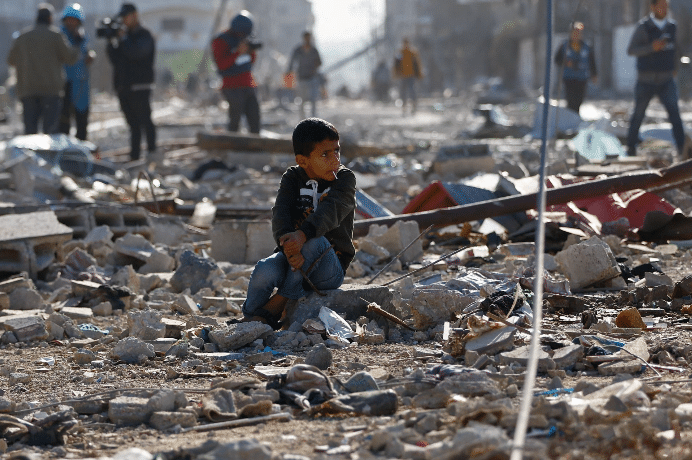From 7 am on Friday, the temporary ceasefire came into force - As analysts report, its observance is a gamble and its outcome will play a role in the continuation of the war
A four-day ceasefire came into effect a day late after nearly seven weeks of continuous shelling of the Gaza Strip. The afternoon is expected to see the first exchange of hostages held by Hamas with Palestinian prisoners held in Israeli prisons.
The next few hours are critical and will determine to a large extent whether there will actually be a four-day cessation of hostilities, as analysts point out that the balance is delicate and there may be a violation of the truce at any moment.
If, on the other hand, the agreement is kept, then it opens a window for an extension of the truce and possibly a way out of the conflict, although Israel has declared anyway that the pause in the fighting does not constitute an end to the war.
Al Jazeera presents the possible scenarios if the truce is kept or not, and where each development could lead both on the battlefield and diplomatically.
Which may lead to the maintenance or violation of the truce
If the truce is kept
The 50 Hamas prisoners and 150 Palestinians in Israeli prisons will be freed and humanitarian aid will be able to reach not only southern Gaza, as has happened in recent weeks, but also northern Gaza, where Israeli forces are mounting a ground offensive, he said. Aboud Hamayel, lecturer at Birzeit University in the occupied West Bank.
But while humanitarian aid there will be welcome, the truce will also raise the question of what to do with northern Gaza, which has been largely emptied of Palestinians, said Sami Hamdi, chief executive of International Interest, a policy think tank. which focuses on the Middle East.
The truce opened the door for more diplomatic engagements and solutions to a possible end to a bloody, bitter conflict.
"There will be more voices demanding that families be allowed to return to northern Gaza in order to reverse Israel's attempt at ethnic cleansing," Hamdi told Al Jazeera.
Still, the ceasefire will be a lifeline for many Palestinians, a chance to recover and "bring people out from under the rubble," Hamayel said.
In Israel, the return of the captives could benefit the image of Israeli Prime Minister Benjamin Netanyahu, who faces growing pressure from their families, the analyst said.
But it was international pressure, in addition to family pressure, that forced the Israeli leader to accept the truce after weeks of refusing similar deals, Hamdi noted.
International pressure will therefore be critical to ensure both sides abide by the ceasefire, Hamayel agreed, with the West particularly concerned that the conflict not escalate.
Extension of the truce
If the four-day ceasefire succeeds, then with international pressure and an agreement by Hamas to release more of the 237 prisoners it currently holds, there is a chance the truce could be extended and last for about three weeks.
In that event, both sides could use this time to recuperate, redeploy their forces, and gather intelligence for the next phase of the war.
Israel may also use the pause to locate Hamas tunnels, something it has not yet done but has hinted it will do.
Israel, while declaring no intention of ending the war, may also prefer a longer pause as the war drains its economy and increases international pressure against it.
It could also increase its raids on the occupied West Bank. More than 226 people have been killed and more than 2.750 injured in the West Bank since October 7.
If the truce is violated
The opposite scenario to the previous two is that of a ceasefire violation, with Israel having more incentive to break it than Hamas, analysts said.
Hamas does not want to lose credibility with its mediators, and the situation for Palestinian civilians is too bad for the group to risk no respite from fighting, Hamayel said.
On the other hand, according to Hamdi, Netanyahu has failed to achieve any of the strategic goals he set when he began the military operations and which compel him to continue fighting.
"He has not succeeded in killing any senior Hamas official. It has not succeeded in eliminating Hamas in Gaza," he said.
But Hamas and its regional allies will certainly not take the ceasefire violation by Israel for granted, with the Palestinian militant group expected to fire rockets into Israel in response and the possibility of a gradual escalation of tension on several fronts of the war, Hamayel said. .
If Hamas breaks the truce, it will anger the West against it and likely increase Israeli aggression both from the air and on the ground, he added.
The organization's regional allies will continue, in this scenario, to focus even more on the ceasefire than on the substance of the Palestinian issue itself, Hamdi noted.
A window to end the war?
Meanwhile, there is concern among Israeli officials, including Netanyahu's allies, that "this hostage exchange is essentially an offer to lure Israel into a permanent ceasefire," Hamdi said.
The prime minister, therefore, is giving assurances that military operations will continue, he added. On Thursday, Israeli Defense Minister Yoav Gallad said the war would continue for at least two more months after the ceasefire ends.
But international pressure for a ceasefire is growing. That was the majority view at a summit earlier this week of the BRICS group, the world's most powerful bloc of emerging economies. UN Secretary-General Antonio Guterres also called for a humanitarian ceasefire.
The truce opened the door for more diplomatic engagements and solutions to a possible end to a bloody, bitter conflict that has rocked the world, Hamayel said.
Source: in.gr
